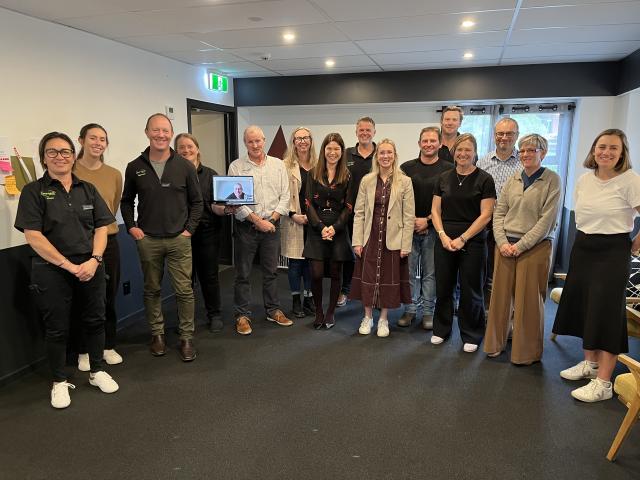B+LNZ’s Environment Reference Group (ERG), made up of representatives from each B+LNZ Farmer Council and Kāhui, met last week in Wellington for thought-provoking discussions with high-profile guests across topics like freshwater farm plans, RMA changes and biodiversity credits.

The ERG is an important way for B+LNZ to co-develop and test environmental policy positions and check policy will be farmer-focused, practical and workable. They provide feedback, advice and input to B+LNZ and meet throughout the year to feed into the latest environment policy developments.
Each B+LNZ Farmer Council region and the B+LNZ Kāhui has one ERG representative and nominates another levy-payer representative who may have particular interest or skills in environment policy and practices.
High-profile guests at the meeting
Opening the July meeting, B+LNZ chief executive Alan Thomson said the number of high-profile speakers willing to give their time reflected the group’s importance.
“It speaks to the mana of this group and to B+LNZ’s considered, science-led approach on environmental issues.”
Speakers included:
- Simon Upton, Parliamentary Commissioner for the Environment
- Hon Mark Patterson, Minister for Rural Communities and Associate Minister of Agriculture
- Hon Andrew Hoggard, Associate Minister of Agriculture and for the Environment
- Rachel Brooking, Labour’s spokesperson for the Environment and RMA Reform.
Farmers’ voices at the table
There were engaging discussions with all the speakers, and ERG members spoke with strength and clarity – not as B+LNZ representatives, but as farmers. They asked sharp, well-informed questions, challenged assumptions, and shared grounded, real-world examples of how policies play out on-farm.
Importantly, ERG engaged constructively with politicians from across the political spectrum, including those with differing views. This approach helped build mutual understanding.
The guest speakers consistently acknowledged the value of their time with ERG, describing the conversations as honest, practical, and constructive.
ERG Chair Bill McCall (Southern South Island Farmer Council) said it was really valuable for the group to meet in person and talk to politicians about environmental policies. “This helps form relationships with the people who are at the front end of forming policy.
“We are also building relationships with the B+LNZ staff who are doing the heavy lifting on behalf of farmers.”
Pushing for enduring policy
One clear theme from the meeting was the need for enduring policy solutions.
Farmers need certainty, and the importance of long-lasting, practical policy that works on the ground and enables farmers to achieve environmental outcomes – rather than short-term fixes – was consistently raised with all guest speakers.
This remains a central focus of B+LNZ’s advocacy, as it is essential for the sector’s future.
The tricky issue of afforestation
ERG raised strong concerns with each of the speakers about the impact of carbon forestry and the loss of productive farmland, driven by the ETS settings.
While there is widespread acknowledgment that wholesale land-use change is problematic, speakers also noted the complexity of addressing the issue, citing issues such as private property rights and cost-of-living pressures to consider when looking at solutions.
There were discussions about what more the sector and individuals could do to address afforestation. Possible actions included building alliances beyond traditional partners, and the need for farmers – and other concerned New Zealanders – to continue raising the issue with their MPs.
Preparing for farm planning frameworks
The ERG discussed the upcoming introduction of mandatory freshwater farm planning, noting that some farmers have assumed freshwater farm plans won’t happen.
The group heard that mandatory farm plans will be legislated by the end of this year.
While the Government aims for farm plans to replace consents, the current landscape of farm plans is complex. B+LNZ is working hard to ensure:
- one plan can meet both national and regional requirements
- equivalency of farm plans (if farmers do FAP+ that should be recognised as equivalent to a freshwater farm plan
- exemptions for low-risk farms are fair and based on actual risk
- requirements are simple, practical, and meaningful – not just red tape.
The discussion with Minister Hoggard, in particular, provided a really good opportunity to deliver these messages and to understand where the process is at.
Discussion also included B+LNZ’s role under the new requirements. We are exploring how best to support farmers, including partnering with others. ERG emphasised that farm plans would need to be genuinely useful for managing their farm, as opposed to just ticking boxes.
Other highlights from the meeting
The group also heard more about B+LNZ’s recent submission on the RMA national direction consultation, to close the feedback loop, and discussed RMA reform.
The importance of B+LNZ’s ongoing advocacy, which is informed by the ERG, was consistently noted throughout the two days.
The group also elected Heather Gilbert (Mid-Northern North Island Farmer Council) as Deputy Chair to support Chair Bill McCall.
Heather said she was excited and honoured to take up the role of Deputy Chair. “Environmental policy in New Zealand is faced with some really complex challenges. It’s great to be part of a team helping to guide policy as it relates practically to farms and farmers.
“ERG meetings are always thought provoking (and sometimes scary) and it’s great to be part of really forward thinking and solutions-focused collaboration.”